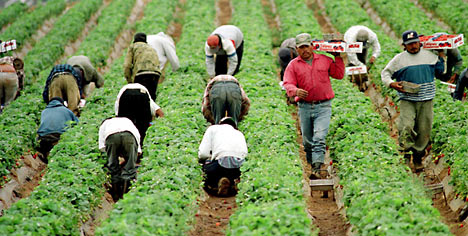With the economy imploding, one of the Republican party's favorite talking points is that excessive government regulation hurts jobs and household budgets. And when Republicans say "excessive," they cast a pretty wide net.
According to the GOP party, the Dodd-Frank financial reform law is the root cause of our recession and continuing economic decline (the fact that the law was passed in response to the near global economic collapse of 2008 might as well be ancient history). And the Environmental Protection Agency has apparently been destroying America since its inception in 1970. As current Texas Governor and presidential hopeful Rick Perry succinctly puts it:
Cemetery of jobs indeed. And Mr. Perry knows a thing or two about jobs: Since 2009, Texas has led the country in job creation (it also has the highest percentage of minimum wage workers in the U.S. and the eighth highest percentage of people living in poverty, but why split hairs?). Not to mention, Mr. Perry knows a thing or two about cemeteries:
But what does this have to do with food?
A topic that I've frequently returned to on this blog is the matter of U.S. food regulation. I've argued that such legislation is vital for consumer safety, as well as the protection of the environment. But what I have yet to mention is how important these regulations are for improving the labor conditions of people working in the food industry.
One of the most interesting segments of the film Food, Inc. documents the exploitation of illegal immigrants by meat processing factories. The filmmakers travel to North Carolina to investigate one of the largest pork slaughterhouses in the world, where undocumented workers toil away under unsafe working conditions.
Smithfield Foods - the company that runs the slaughterhouse - is able to bus these workers into its factory because it regularly tips off U.S. Immigration and Customs Enforcement (ICE) with the names of undocumented employees. In exchange, ICE agents stay away from the plant floor.
Practices like those at Smithfield aren't going to be solved by lessening regulation. But it's difficult to make headway on these issues in the political arena when the power disparity between migrant workers and companies like Smithfield is so great.
 You might find it shocking that people could be treated this way, but 20 years ago Mr. Perry actually ran for the position of agricultural commissioner in Texas on a platform of abuse. In 1990, the Democratic incumbent, Jim Hightower, had come under fire for his efforts to regulate pesticides. In his campaign against Hightower, Mr. Perry argued for repealing a Hightower rule requiring farmers to get their workers out of the fields before they sprayed pesticide on them. Mr. Perry won that race.
You might find it shocking that people could be treated this way, but 20 years ago Mr. Perry actually ran for the position of agricultural commissioner in Texas on a platform of abuse. In 1990, the Democratic incumbent, Jim Hightower, had come under fire for his efforts to regulate pesticides. In his campaign against Hightower, Mr. Perry argued for repealing a Hightower rule requiring farmers to get their workers out of the fields before they sprayed pesticide on them. Mr. Perry won that race.
I read about this frightening instance of politicking in an op-ed piece by Gail Collins from last Sunday's NY Times "Week in Review" section. While it struck me as absurd and dispiriting at the time, it didn't truly impact me until later in the week when I was interviewing an attorney as part of my job as a writer for a publication that profiles law firms.
The lawyer explained to me that one of the firm's highest-profile cases involved a baby boy who was born without arms or legs as a result of his mother having been repeatedly sprayed with pesticides while she was working in crop fields owned by the tomato grower Ag-mart Produce. And this apparently isn't an uncommon practice among tomato growers: See the case of Fish Farms.
It's reprehensible that Mr. Perry openly advocated to repeal regulation designed to prevent these abuses. Not all regulations are worthwhile, but arguing for a moratorium on regulations - which he has in the past - chips away at the government's social contract. And in the case of the pesticide rule, it shows a profound lack of common human decency.
No comments:
Post a Comment